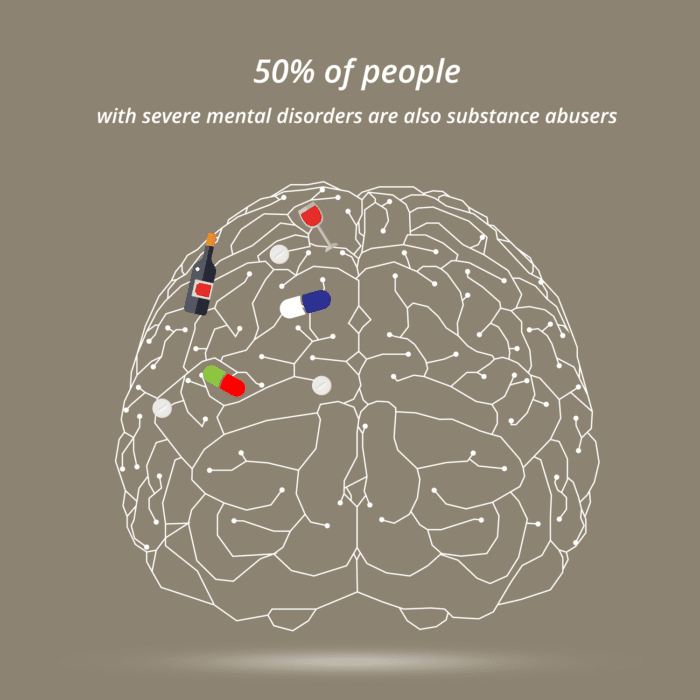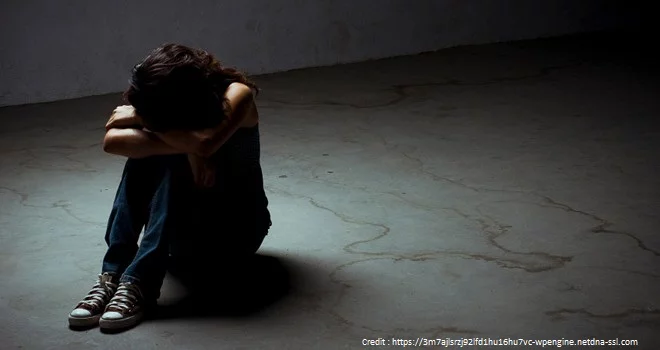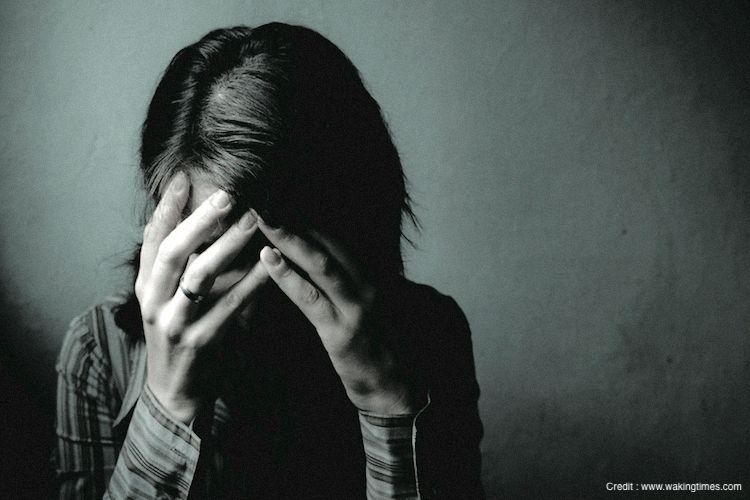Addiction is a daily battle but what happens if you are also fighting with other co-occurring mental health disorders like depression or personality disorder? Imagine making your way through a 12 step programme only to discover that the reason for your alcohol addiction was partially due to clinical depression. If you are a substance abuser who feels like you are not finding the answers you are searching for, then chances are you might need dual diagnosis rehab.
What is Dual Diagnosis?
When a combination of conditions present simultaneously in a patient – such as drug addiction and depression or post traumatic stress disorder and anxiety disorder – it is a dual diagnosis scenario. For a long time people who were suffering from signs of mental health disorders such as mood swings, panic attacks and anxiety, received treatment separately from those who were seeking help for drug or alcohol abuse. When these problems became intertwined – patients were often refused treatment for their mental health issues until they cleaned up their act. What we now know is that the patient needs to be treated holistically if they are to recover in the long-term.
Types of Dual Diagnosis

There are many types of dual diagnosis but in general, we can break them up into three main categories:
Addiction + Mental Health
According to the American Medical Association about 50 percent of people with severe mental disorders also struggle with substance use disorder. A large majority of alcohol and drug users also have at least one, if not two mental health issues.
Addiction and mental health disorders like depression are closely linked and while drug taking and alcohol consumption can intensify and prolong psychotic reactions, one does not directly cause another. We do know, however, that drugs and alcohol are used to ease the symptoms of mental health problems – with sufferers self-medicating to try and dull the pain.
Undiagnosed mental health conditions that lead to sudden mood changes or social awkwardness often result in sufferers turning to substances to help them cope with their emotions or temporary ‘fix’ their mood but in the long term their addiction will cause side effects and intensify the symptoms of their mental illness.
The difficulty with this dual diagnosis is also due to the fact that medications used to treat certain mental health issues can be compromised or become ineffective if used at the same time as drugs and alcohol.
Common mental health issues that often co-occur substance abuse disorders include:
- Anxiety
- Depression
- Attention Deficit and Hyperactivity Disorder (ADHD)
- Obsessive Compulsive Disorder (OCD)
- Schizophrenia
- Bipolar disorder
Addiction + Trauma
In most cases childhood trauma or a traumatic experience in adulthood leads to substance abuse but it can also work in reverse – that is, addiction can lead to trauma.
Many victims of trauma do not want to admit that they are suffering. They don’t want to talk about painful memories or dig up issues from their past. They use drugs, sex, gambling, gaming or alcohol to help them forget about whatever horrible thing happened to them and when they are drunk or high, they find some relief.
For example, someone who has been sexually abused as a child might suffer from alcohol addiction as an adult, or war veterans might become addicted to pain medication.
Mental Health + Trauma
As with the two other general types of dual diagnosis, it can be difficult to know which comes first when it comes to mental health issues and trauma. For some patients suffering from severe mental health disorders, it’s their condition that can lead them to having traumatic experiences – such as being physically or sexually abused by others.
But in many cases it’s a traumatic incident that leads to years of mental illness for patients – particularly when it comes to Post Traumatic Stress Disorder (PTSD) from car crash survivors, natural disaster survivors or war veterans. A traumatic event can lead to the development of phobias, intense anxiety and problems with relating to others.
Challenges of Getting a Dual Diagnosis
There are major challenges that prevent a large number of patients from getting the right diagnosis for their conditions. For example, alcohol or marijuana consumption can often lead to depression due to the chemical effects of the substances so often clinicians will not necessarily recognise that a patient has a serious mental health issue as they’ll attribute their blueness to the drugs. Similarly, alcohol is well known to cause anti-social behaviour. When it comes to trauma, many patients are told that over time their anxiety will ease but that’s not always the case.
Dual Diagnosis Treatment
And when it comes to treatment – it’s important to seek help from specialists who have experience in the field so that they can tailor a programme of recovery specifically for your needs. Dual diagnosis treatment is complicated and, to be successful, must take into account the ‘big picture’ – for example, the patient’s childhood, traumatic experiences, medical and drug usage history, family history, relationship issues and social life. Only then can a therapist formulate an effective dual diagnosis rehab programme.
Finding the Right Dual Diagnosis Rehab
If you are suffering from more than one condition and feel that you need a proper diagnosis, our team of highly qualified therapists and psychologists at The Dawn are here to provide you with the help you need. We offer patients a strictly confidential and world class service at rates that are far more affordable than those found in countries like Australia, the USA and the UK. We can tailor a treatment plan that not only helps you with detox and addiction treatment, but also get to the heart of what might be causing you to use substances – such as childhood trauma or mental health issues. We can then tailor a dual diagnosis rehab programme specifically to meet your needs.
Contact our team today for a free consultation.
Related Posts
 Trauma Therapy – How to Overcome a Painful Past and Create a Better Future
Many people who seek trauma therapy suffer consequences of one or more traumatic events in their life. Even though many find ways to process trauma effectively and eventually resolve their...
Trauma Therapy – How to Overcome a Painful Past and Create a Better Future
Many people who seek trauma therapy suffer consequences of one or more traumatic events in their life. Even though many find ways to process trauma effectively and eventually resolve their...
 Treating Addiction and Mental Issues through Dual Diagnosis Treatment
With our complex minds and rich tapestry of emotions, our behaviours can rarely be traced back to a single cause. A feeling of stress or anxiety, for example, may make...
Treating Addiction and Mental Issues through Dual Diagnosis Treatment
With our complex minds and rich tapestry of emotions, our behaviours can rarely be traced back to a single cause. A feeling of stress or anxiety, for example, may make...
 Childhood Trauma: Causes, Symptoms and Treatment Techniques That Can Help You Move Forward
The National Institute of Mental Health in the United States defines childhood trauma as, ‘’The experience of an event by a child that is emotionally painful or distressful, which often results in...
Childhood Trauma: Causes, Symptoms and Treatment Techniques That Can Help You Move Forward
The National Institute of Mental Health in the United States defines childhood trauma as, ‘’The experience of an event by a child that is emotionally painful or distressful, which often results in...
 Trauma-Focused Cognitive Behavioural Therapy – An Effective Method of Overcoming Trauma
Traumatic life events can have a severe impact on anyone who goes through them. However, children and adolescents are especially vulnerable to the effects of trauma. It can quickly take...
Trauma-Focused Cognitive Behavioural Therapy – An Effective Method of Overcoming Trauma
Traumatic life events can have a severe impact on anyone who goes through them. However, children and adolescents are especially vulnerable to the effects of trauma. It can quickly take...





